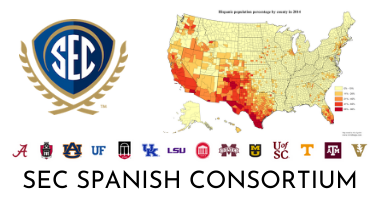
Research Products
Listening to the Voices of Educators on the Mississippi Seal of Biliteracy Implementation
This project is currently in process.
Abstract
In the Fall of 2019, the Mississippi Department of Education adopted the Mississippi Seal of Biliteracy (MSSoBL), changing our state’s educational language policy from English-only to English-plus another world language, which elevated Spanish and other world languages to a status closer to English in the districts that have adopted the Mississippi Seal of Biliteracy. The Seal of Biliteracy promotes bilingualism and supports Spanish home language speakers in the schools (MDE, 2021). Unlike the previous language policies, it promotes an orientation of language as a resource, from which, according to Ruiz (1984), both native and non-native English speakers benefit. Key individuals implementing and participating in this policy must have a positive perception of learning world languages. There is currently no data on the implementation of the Mississippi Seal of Biliteracy or on the perceptions held by public school personnel on the seal. According to Johnson (2013), the status of a language in a community will either lead to its maintenance or its shift depending on the ideologies created by the majority.
My intention is to survey the benefits, barriers and perceptions of teachers, administrators and counselors living in schools in North Mississippi on the implementation of the Mississippi Seal of Biliteracy. This meaningful study will add information to the limited existing literature on the implementation of The Mississippi Seal of Biliteracy from the perspectives of school personnel. The study will employ a qualitative method of data collection made up of questionnaires and interviews to answer these overarching questions: (1) What learning outcomes/benefits has the Mississippi Seal of Biliteracy generated in the district where it has been adopted? (2) What new practices have been implemented as a result of the adoption of the MSSoBL? (3) What barriers and roadblocks have administrators, counselors and teachers experienced? (4) What are the perceptions held by administrators, counselors and teachers about the Mississippi Seal of Biliteracy? (5) For the districts that have not adopted the seal, why have they not adopted it? (6) Comparing the districts that have adopted the Seal of Biliteracy with the one that has not, what are the perceived benefits and roadblocks? What are the differences between them?
The participants include school administrators, school-teachers and school counselors from one district that has adopted, and another that has not adopted the Mississippi Seal of Biliteracy. The study will employ data collection using two sets of instruments: (1) questionnaires with closed and open response items and (2) semi-structured interviews to gather background information and to determine the benefits, barriers and the different types of perspectives participants hold on the implementation of the Mississippi Seal of Biliteracy. Educators are essential stakeholders in language policy implementation. Their voices must be heard by policy makers and parents as the Mississippi Seal of Biliteracy is successfully implemented.
Committee Members: Dr. Felice Coles (Chair), Dr. Stephen Fafulas, Dr. Tamara Warhol, Dr. Larissa Warhol

